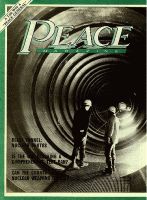
Peace Magazine September 1985, page 28. Some rights reserved.
Search for other articles by Ken Hancock here
THE LABOR MOVEMENT has always been a struggle to secure human rights in the economic system. The most notable right it has protected, of course, is the right to a decent wage. But it has taken on many other equally important human rights that are not just monetary: The women's movement has linked itself to the labor movement, for example, by turning sexual harassment into a labor grievance. The ecological movement has linked itself to the labor movement by turning radiation health and safety and other environmental hazards into a labor issue.
Now it is the peace movement's turn. Labor is ready. Only recently the touring parliamentary committee on international relations listened to union leaders everywhere emphasizing their opposition to Star Wars. Robert White, of the United Auto Workers, said, "I can think of no greater condemnation of an economic system than the argument that the only way to provide jobs-in the face of such obvious human needs here and abroad-is to accelerate the arms race into space.
Unfortunately, the peace movement has not yet articulated any demands that workers can recognized as integrally related to their struggle for human rights in the economic system. Economic conversion is a peace issue, but it cannot be made into an issue separate from labor's other struggles with capital. To make economic conversion into labor's issue, the peace movement must present it as a concept that will help protect workers (both organized and unorganized) from the loss of jobs while simultaneously increasing their right to refuse to participate in military production.
The means through which such a struggle can be carried out is, I believe, a conscientious objector status for the workplace. This can be introduced as a Private Members Bill in the House of Commons to secure the rights of industrial, non-industrial, and civilian workers in the defence industry. It can also become part of the normal collective bargaining process. Thus the auto workers union, say, could demand this as a right guaranteed their workers in weapons factories. The bill (see model below) would assure workers the right to know about the nature of the military contract for which their labor is being used. In itself, such a move would challenge the anti-democratic and elite management of "national security" matters. This concept is not used against spies as much as against citizens, to keep them from knowing about the policies and weapons that threaten the whole planet. Workers have won the right to know about unsafe work conditions; this bill will extend their rights beyond the protection of their physical health to their moral health. It will preserve them from the exploitation of their "souls," if you like, in the manufacture of weapons of mass destruction.
The right of conscientious objection in the workplace would merge the traditional conscientious right to object against the warmaking of the state with the struggle against capital's "unemployment terrorism" against dissenting workers. It will place before the peace movement an actual issue of workplace politics. It will show how people are normally "conscripted" into the military system-not by being drafted into an army, but in two other ways. First, there's the psychological conscription into the Cold War culture; second, there's also the conscription of people's labor into military production, either directly or indirectly, through taxation.
This bill will make the employer responsible for finding alternative employment for workers who refuse to work on military projects. It will empower Human Rights Commissions to enforce compliance with this process, and it challenges the government to enact budgetary and economic conversion policies to protect workers. The test of a government's sincerity which claims to favor peace will be its willingness to protect its working citizens from the defence industry.
Job retraining will become necessary.
The bill will allow all Canadian taxpayers to divert that percentage which funds the military to a job retraining fund for conscientious objector workers. Thus the resistance against military taxation can be linked to the struggle for workplace rights. Peace activists can make both causes their own. All Canadians, through the alternative use of their taxes, can support defence workers in their conversion to pro-human jobs.
The bill will also challenge the private decision making of capital. The workplace will be opened to alternative sources of information about the arms race. We will address the issue of the relationship of the community to corporate control. Today the mobility of capital renders local communities powerless. Litton Industries, for example, can transfer their capital to other parts of the world, beyond any local point where political pressure may be applied on them. Not only can they terrorize the planet by building weapons of mass destruction, but they can terrorize the local community by threatening to relocate if their interests are challenged. This bill will deny the presumption that "private" interests have the right to threaten the entire public (global) realm.
I believe that support can be mobilized for such a bill. Surely the NDP caucus would take it on as an expression of their commitment to peace. Likewise, the churches could be mobilized to support the struggle of working people in the defence industry. Organized labor, above all, can begin to demand through the collective bargaining process the rights that it is meant to secure. The struggle for disarmament will begin to speak to the concerns of workplace oppression shared by all working people.

Peace Magazine September 1985, page 28. Some rights reserved.
Search for other articles by Ken Hancock here